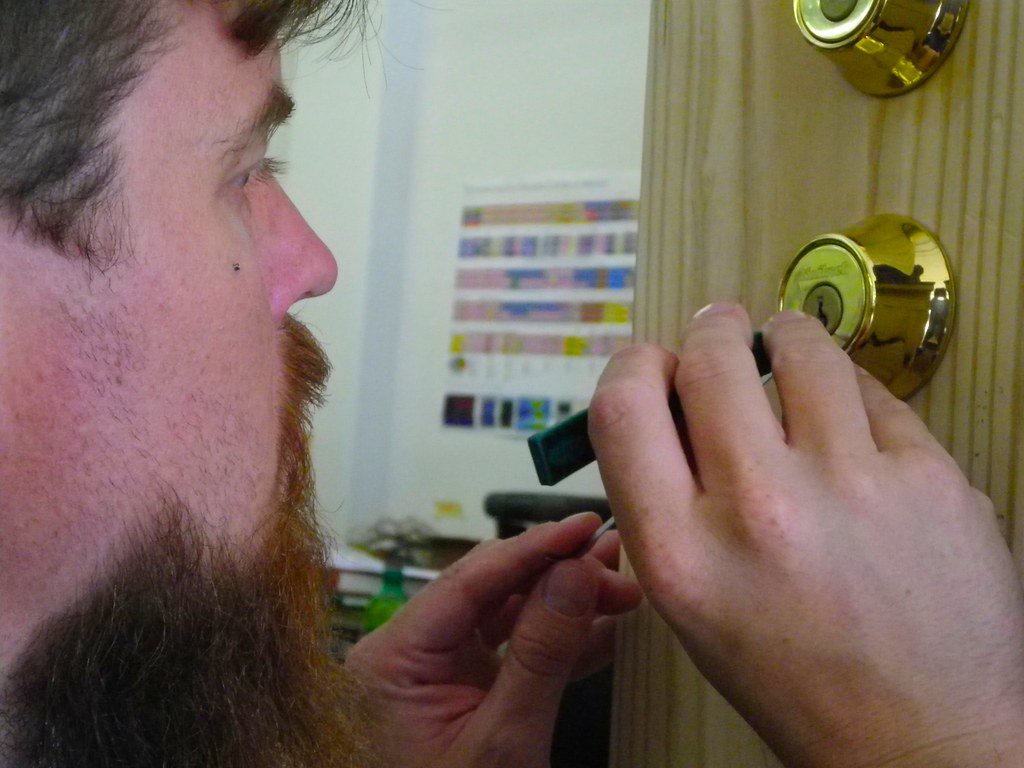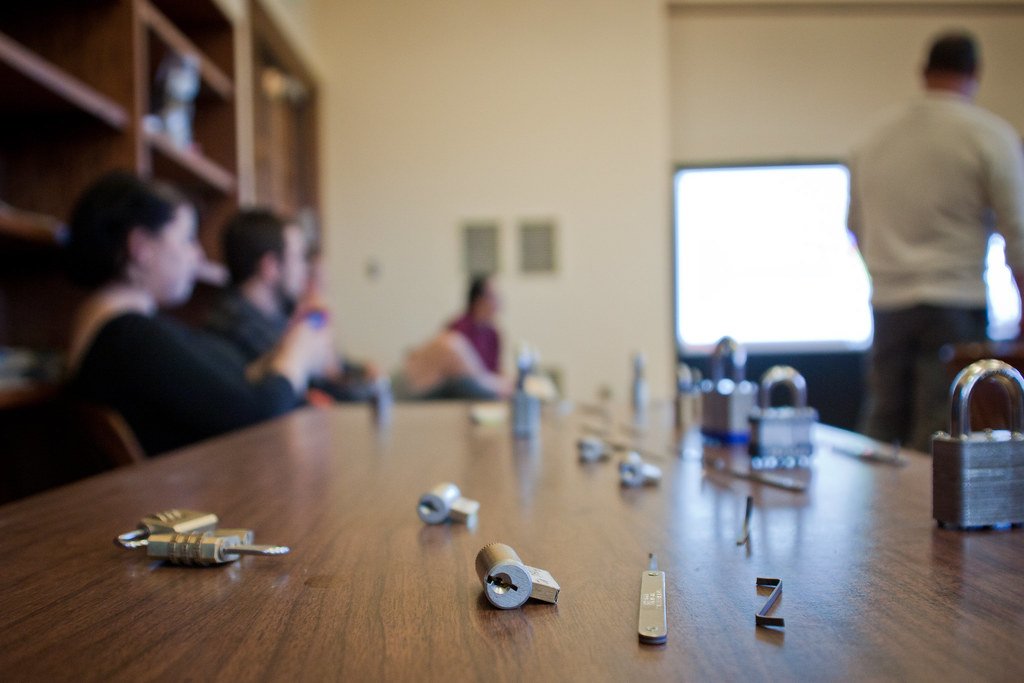In a world where parents often worry about their children’s screen time and lack of real-world skills, there emerges a surprising, yet captivating, solution – Locksport for kids. As an unconventional therapeutic activity gaining momentum, Locksport introduces young ones to the mesmerizing art of lock picking. With its intricate puzzles and mysterious allure, this ancient-skill-turned-modern-hobby has caught the attention of therapists who see it as a promising means of nurturing focus, problem-solving skills, and even building emotional resilience. In this article, we delve into the world of Locksport and discover how therapists are viewing this engrossing hobby through the lens of childhood development.
Table of Contents
- Unlocking the Benefits: How Locksport Can Benefit Kids’ Cognitive Development
- Building Resilience and Problem-Solving Skills through Locksport for Children
- Empowering Young Minds: Boosting Confidence and Self-Esteem with Locksport Activities
- Unlocking Opportunities: Fostering Social Skills and Teamwork in Locksport for Kids
- The Therapist’s Toolbox: Recommendations for Incorporating Locksport into Therapy Sessions for Children
- Q&A
- Insights and Conclusions

Unlocking the Benefits: How Locksport Can Benefit Kids’ Cognitive Development
Engaging children in the world of locksport can do wonders for their cognitive development. This unique activity goes beyond the thrill of picking locks—it presents numerous opportunities for young minds to grow and flourish. Here’s how:
- Enhanced problem-solving skills: Locksport challenges children to think critically and strategically. From analyzing lock mechanisms to figuring out the right tools and techniques, they develop problem-solving skills that can be applied to various real-life situations.
- Improved fine motor skills: Manipulating lock picks and carefully maneuvering them within the restricted space of locks help refine a child’s fine motor skills. This precision extends to their fingers, enabling them to be more dexterous in other activities such as playing a musical instrument or typing.
- Increased patience and persistence: Locksport requires patience and persistence, as picking locks often demands perseverance. Children learn to stay focused, overcome setbacks, and celebrate small victories along the way. These qualities are transferable and can be valuable in other aspects of their lives.
Incorporating locksport into a child’s routine not only provides them with an unconventional and exciting hobby but also contributes significantly to their cognitive growth. So, unlock the potential benefits of locksport for your child, and watch their mind soar as they conquer the intricate world of locks and keys.

Building Resilience and Problem-Solving Skills through Locksport for Children
In a world where challenges constantly arise, it becomes imperative for children to develop resilience and problem-solving skills from a young age. Locksport, an engaging and educational activity, provides an exciting opportunity for children to cultivate these essential life skills while learning the art of lock picking.
Locksport not only enhances a child’s problem-solving abilities but also nurtures resilience by encouraging them to persist in the face of challenges. When confronted with a complex lock, children are propelled to think critically, analyse the situation, and experiment with different techniques to overcome each hurdle. Through the journey of exploring locks, children discover the power of perseverance and develop the tenacity needed to tackle difficulties in various aspects of their lives.
- Boosts analytical thinking: Engaging in the puzzles presented by locks requires children to think logically, assess patterns, and use deductive reasoning to find solutions.
- Fosters creativity: Locksport allows children to think outside the box, exploring innovative approaches to tackle challenges, and nurturing their creative problem-solving skills.
- Promotes coordination: Manipulating lock mechanisms with delicate tools improves fine motor skills, hand-eye coordination, and dexterity.
- Encourages patience: Mastering the art of lock picking demands patience and self-control. Children learn to embrace delayed gratification and persevere until they achieve their desired result.
Locksport for children not only opens new doors of exploration but also equips them with invaluable skills that will serve them throughout their lives. So, let your child embark on this adventure, building resilience and problem-solving abilities while immersing themselves in the fascinating world of locks!
Empowering Young Minds: Boosting Confidence and Self-Esteem with Locksport Activities
Locksport activities offer a unique platform to boost confidence and self-esteem in young minds. By engaging in the art of lock picking, children and teenagers can unlock not only physical padlocks but also unleash their inner potential. Through the journey of mastering this skill, they experience a sense of accomplishment and develop a newfound belief in their abilities.
Locksport activities provide a safe and controlled environment for young individuals to explore their problem-solving skills and embrace challenges. As they acquire the knowledge of manipulating locks, they learn to think critically and creatively, finding innovative solutions to unlock each puzzle. With each successful unlock, their confidence grows, and they realize that perseverance and determination lead to success.
Furthermore, lock picking activities foster a sense of responsibility in young minds. Participants learn the importance of ethical behavior and the necessity of using their newfound skills responsibly. This not only contributes to their personal growth but also instills a set of values that they can carry into various aspects of their lives.
Unlocking Opportunities: Fostering Social Skills and Teamwork in Locksport for Kids
Fostering social skills and teamwork is a crucial aspect of any child’s development, and what better way to unlock these opportunities than through Locksport? Locksport, the recreational activity of defeating various types of locks, not only offers an exciting and challenging outlet for children but also provides a platform for them to learn and grow.
By participating in Locksport, kids have the chance to engage in collaborative problem-solving activities that require effective communication and teamwork. Unlocking opportunities for children to work together, they can develop vital social skills like active listening, compromise, and empathy. Engaging with their peers in an environment that promotes cooperation, they gain a deeper understanding of the importance of working together towards a common goal.
Mentors and coaches within the Locksport community play a vital role in fostering these skills. Through their guidance and support, children can learn not only the technical aspects of lock picking but also the values of sportsmanship, patience, and respect. Unlocking these valuable life skills equips kids with the tools they need to thrive in various team-oriented settings, both within Locksport and beyond.
- Enhances communication and active listening skills
- Promotes teamwork and collaboration
- Encourages problem-solving and critical thinking abilities
- Fosters patience, perseverance, and sportsmanship
- Builds empathy and respect for others
The Therapist’s Toolbox: Recommendations for Incorporating Locksport into Therapy Sessions for Children
Locksport, the art of picking locks as a recreational exercise, may seem like an unconventional concept to introduce into therapy sessions for children. However, this unique activity can offer numerous benefits for young patients struggling with various emotional, social, and cognitive challenges. By incorporating locksport into therapy sessions, therapists can create an engaging and interactive environment that promotes growth and development in children. Here are some recommendations for how therapists can incorporate locksport into therapy sessions:
- Creating a Safe Space: Before introducing locksport, it is crucial to ensure a safe and secure environment for the child. This may include providing proper supervision, using child-friendly tools, and establishing clear rules and boundaries.
- Building Fine Motor Skills: Locksport can help children develop and refine their fine motor skills. The intricate movements required to manipulate locks can improve hand-eye coordination, dexterity, and finger strength.
- Promoting Problem-Solving: Locksport presents children with puzzles to solve, challenges to overcome, and obstacles to tackle. Encouraging them to think critically and analytically fosters problem-solving skills, creativity, and perseverance.
Introducing locksport into therapy sessions may initially raise eyebrows, but thinking outside the box can often lead to extraordinary results. By incorporating locksport, therapists can tap into a child’s curiosity, engagement, and determination, ultimately unlocking their potential for growth and development.
Q&A
What is locksport?
Locksport is a recreational activity involving the manipulation and picking of locks as a hobby or sport. It focuses on understanding the inner workings of locks and mastering techniques to open them.
Why is locksport becoming popular among kids?
Locksport provides kids with a stimulating and challenging activity that boosts problem-solving skills and dexterity. Additionally, it offers a sense of accomplishment and fosters curiosity, making it appealing to children.
Is locksport a safe activity for kids?
Locksport can be safe for kids if practiced under adult supervision and with the necessary precautions. It is crucial to emphasize responsible behavior, including abstaining from bypassing locks without proper authorization.
How can locksport benefit children’s development?
Engaging in locksport can enhance children’s cognitive skills, fine motor control, and patience. It promotes critical thinking and persistence while also nurturing creativity and the ability to think outside the box.
Can locksport for kids serve as therapy?
Yes, locksport can be an effective form of therapy for children. It can help develop focus, hand-eye coordination, and problem-solving abilities. Moreover, it can boost self-confidence and self-esteem.
Are there any potential drawbacks to locksport for kids?
While locksport offers many benefits, it is important to keep an eye on potential drawbacks. Children may be tempted to use their newfound skills irresponsibly or without proper consent. It is vital to educate them about ethical use and stress the importance of always seeking permission.
How should parents or therapists introduce locksport to children?
Parents or therapists should start by teaching children the ethical considerations surrounding locksport. They should emphasize the importance of responsible behavior and ensure the activity is practiced in a controlled environment with the necessary guidance and supervision.
Could locksport lead to illegal activities?
While it is essential to address this concern, the vast majority of children who participate in locksport do not engage in illegal activities. Teaching them about ethical use and promoting responsible behavior greatly reduces the risk of misuse.
Insights and Conclusions
And with that, our journey through the world of Locksport for Kids comes to a close. Through the eyes of a therapist, we have explored the fascinating realm of locks, keys, and the art of picking. What started as a curious exploration of a seemingly unconventional hobby has revealed itself to be a treasure trove of therapeutic benefits for young minds.
In their little hands, lock-picking tools have transformed into instruments of creativity and problem-solving. With every twist and turn of a lock, children have experienced a sense of empowerment, as they successfully unlock their own potential. As therapists, we cannot help but marvel at the transformative power of Locksport.
Through this article, we have come to understand that Locksport for Kids is not merely about teaching children technical skills. Rather, it offers them an outlet for their boundless creativity, a sanctuary to hone their analytical thinking, and a platform to develop their patience and resilience. In this world, locks become puzzles waiting to be solved, and children embrace the challenge with unbridled enthusiasm.
Parents and guardians who may initially have had reservations about their youngsters engaging in Locksport have also discovered the unconventional therapeutic benefits that it provides. It is a playground that nurtures a child’s confidence and self-esteem, where mistakes are not failures but opportunities to learn. It encourages teamwork, fosters critical thinking, and instills a sense of discipline – all valuable life skills that will undoubtedly serve these children well beyond the realm of locks and keys.
As we bid farewell to the world of Locksport for Kids, our hope is that this article has shed light on the positive impact this unique hobby can have on young minds. It is a testament to the power of unconventional methods in fostering growth and development. So, let us embrace the magic of locks and keys as our children embark on a journey of exploration and self-discovery, unlocking a world of endless possibilities.
As an affiliate, my content may feature links to products I personally use and recommend. By taking action, like subscribing or making a purchase, you’ll be supporting my work and fueling my taco cravings at the same time. Win-win, right?
Want to read more? Check out our Affiliate Disclosure page.